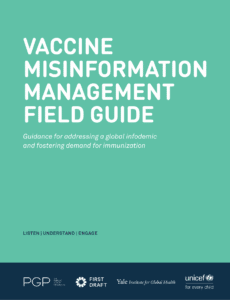Misinformation Alerts
Knowing what misinformation is being shared can help you generate effective messaging.
These insights are based on a combination of automated media monitoring and manual review by public health data analysts. Media data are publicly available data from many sources, such as social media, broadcast television, newspapers and magazines, news websites, online video, blogs, and more. Analysts from the Public Good Projects triangulate this data along with other data from fact checking organizations and investigative sources to provide an accurate, but not exhaustive, list of currently circulating misinformation.
Misinformation Alerts
Knowing what misinformation is being shared can help you generate effective messaging.
These insights are based on a combination of automated media monitoring and manual review by public health data analysts. Media data are publicly available data from many sources, such as social media, broadcast television, newspapers and magazines, news websites, online video, blogs, and more. Analysts from the Public Good Projects triangulate this data along with other data from fact checking organizations and investigative sources to provide an accurate, but not exhaustive, list of currently circulating misinformation.Alerts are categorized as high, medium, and low risk.
- High risk alerts: Narratives with widespread circulation across communities, high engagement, exponential velocity, and a high potential to impact health decisions. Are often more memorable than accurate information.
- Medium risk alerts: Narratives that are circulating in priority populations and pose some threat to health. Potential for further spread due to the tactics used or because of predicted velocity. Often highlights the questions and concerns of people.
- Low risk alerts: Narratives that are limited in reach, don’t impact your community, or lack the qualities necessary for future spread. May indicate information gaps, confusion, or concerns.
The U.S. is currently experiencing supply chain delays due to a combination of worker shortages and global production issues. Many political commentators have inaccurately blamed employer vaccine mandates for the shortages, but these issues predate local, state, and federal employer vaccine requirements. The pandemic caused major disruptions to the global supply chain at almost every level. At the height of the pandemic, many manufacturers slowed down or halted production on certain products, leading to widespread layoffs. Now, the ability to produce and ship supplies is lagging behind the increased global demand.
Recommendation: Conspiracy theories and misinformation continue to spread as companies enforce vaccination policies. Only a small minority of workers are not complying with vaccine mandates, and polling shows that the majority of Americans support the federal vaccine mandates. Emphasizing that a majority of employees are choosing vaccination over losing their jobs is recommended. Fact Checking Source(s): USA Today, New York Times
Several conservative websites and a member of Congress have alleged that the Occupational Safety and Health Administration (OSHA) has changed its guidance for employers reporting work-related injuries to encourage them to sweep COVID-19 vaccine side effects under the rug. According to the agency’s recording criteria, work-related injuries or illnesses must be reported if they result in death, loss of consciousness, days away from work, work restriction or transfer, or medical treatment beyond first aid. In late May, OSHA updated its reporting rule to clarify that adverse events related to COVID-19 vaccines are not considered work-related injuries or illnesses. Employment law experts interpret the updated rule as easing the burden on employers because potential vaccine side effects are not a result of working conditions that could reasonably be altered to eliminate risk.
Recommendation: There is widespread confusion over OSHA’s role in implementing vaccine mandates and in managing COVID-19-related issues in the workplace. Providing clear guidance to business owners and explaining how the updated rules help employers is recommended. Fact Checking Source(s): OSHA, National Law Review
A U.S. senator who has previously spread COVID-19 misinformation repeated multiple debunked claims about the COVID-19 vaccines, including that the vaccines are dangerous and ineffective, vaccine mandates are “pointless,” and treatments like ivermectin are being suppressed in favor of vaccines because “there’s no money in it.” An article covering the senator’s comments has been widely shared on social media. The COVID-19 vaccines are safe, highly effective, and the best way to protect against COVID-19. To date, there is no scientifically validated evidence that ivermectin can prevent or treat COVID-19.
Recommendation: Whenever high profile politicians spread false claims, misinformation and general conversation around COVID-19 spike. Debunking each instance of misinformation can shift valuable resources away from priority talking points. However, vaccines and pandemic protocols are increasingly politicized. This has resulted in significant disparities in accurate health information. Wherever possible, continuing efforts to keep elected officials informed and supporting bipartisanship in immunization and pandemic response efforts is recommended. Fact Checking Source(s):Washington Post
A conservative talk show that has previously shared COVID-19 misinformation posted multiple videos claiming that COVID-19 vaccines contain graphene and "self-assembling" parasites that react to graphene. These claims are false. The ingredients for all authorized COVID-19 vaccines are publicly available and none contain graphene or parasites.
Recommendation: Wild, incorrect speculation on vaccine ingredients continues to fuel misinformation online. Ensuring that informational materials are updated and continue to debunk these false claims is recommended. Fact Checking Source(s): Health Feedback
A video with nearly 1,400 views falsely claims that COVID-19 vaccines weaken the immune system, contain HIV and harmful bacteria, and kill 20 to 30 percent of people who receive them. The video also repeats the debunked myth that COVID-19 vaccines failed animal testing. The vaccines train the immune system to effectively protect against COVID-19. The ingredients for all available vaccines have been publicly available online for nearly a year. The video comes on the heels of a Public Health England report that has been misrepresented by anti-vaccine advocates to claim that COVID-19 vaccines cause AIDS. Charts from the report were manipulated to make it appear that the immune systems of vaccinated people were degrading over time.
Recommendation: Because these false claims have been repeated in many circles and by some high profile individuals, updating materials to debunk claims about HIV and the COVID-19 vaccines is recommended. Fact Checking Source(s): Full Fact, Lead Stories
A former journalist who was banned from social media platforms for posting COVID-19 misinformation has taken to a personal blog to spread the false claim that vaccinated people have a weaker immune response than unvaccinated people, even among those who have had and recovered from a COVID-19 infection. It’s unclear how he has come to that conclusion, although the post uses a closely cropped screenshot of a passage from a recent Public Health England report as alleged evidence for the claim. The full report clarifies that in populations with high vaccination rates, a larger proportion of the infections, hospitalizations, and deaths will be among the vaccinated because there are far more people who are vaccinated than not and no vaccine is 100 percent effective.
Recommendation: There continues to be wild speculation comparing the immunity between the vaccinated and unvaccinated. Continuing to emphasize that vaccine-induced immunity provides the safest, most reliable protection is recommended. Helpful talking points can be found here. Fact Checking Source(s):USA Today, UK Health Security Agency
A post on a far-right legal website falsely claims that none of the available COVID-19 vaccines are FDA-approved because Comirnaty is different from the Pfizer COVID-19 vaccine that has been administered since December. This myth was repeated by a U.S senator who has been critical of COVID-19 public health guidelines throughout the pandemic. Comirnaty is simply the brand name for the Pfizer COVID-19 vaccine. It’s common for drugs to have a research name until FDA approval. Prior to FDA approval, the Pfizer-BioNTech vaccine was called BNT162b2 by researchers and the “Pfizer vaccine” by the public. Now that the vaccine is FDA-approved, it is marketed under the name Comirnaty.
Recommendation: The addition of the Comirnaty name has caused confusion and fueled misinformation. Ensuring that informational materials explain the name change and use both names side-by-side (Pfizer-BioNTech and Comirnaty) in the same materials is recommended. Fact Checking Source(s): Nebraska Med, PolitiFact 
A social media post with more than 20,000 engagements falsely claims that Finland, Sweden, Iceland, and Norway have all banned the Moderna COVID-19 vaccine. This claim is untrue. Finland and Sweden have paused the administration of the vaccine in teens and young adults while a potential rare myocarditis and pericarditis risk in the population is investigated. For similar reasons, Norway recommends that men under age 30 receive the Pfizer vaccine and Iceland is using the Moderna vaccine only as a booster for people aged 60 and older. Protocols in each of these countries are expected to continue to change as more information becomes available.
Recommendation: There continues to be widespread misinformation around mRNA vaccines and the risk of myocarditis and pericarditis. The limited number of cases of heart inflammation in teens and young adults following COVID-19 vaccination has caused understandable concern and information seeking. Organizations are recommended to directly address these concerns and to update informational and educational materials accordingly. Fact Checking Source(s): Newsweek
A rumor that has spread across multiple social media platforms and conservative news sites claims that Southwest Airlines flight cancellations are the result of airline workers, specifically pilots, protesting the company’s COVID-19 vaccine requirements. Official statements from the airline, the Federal Aviation Administration, and the Southwest pilots union have contradicted this narrative, saying that the cancellations were due to weather and air traffic control issues.
Recommendation: Conspiracy theories and misinformation continue to spread as companies enforce vaccination policies. Only a small minority of workers are not complying with vaccine mandates, and polling shows that the majority of Americans support the federal vaccine mandates. Emphasizing that a majority of employees are choosing vaccination over losing their jobs is recommended. A helpful overview of the White House COVID-19 Action plan is available here. Fact Checking Source(s): Snopes, Washington Post
A video posted to social media features a 2015 interview of Klaus Schwab, an economist who founded the World Economic Forum, saying that gene editing impacts an individual’s identity. The video falsely claims that this statement is evidence that mRNA vaccines can alter genetic material. At no point in the interview does Schwab mention vaccines. The technology that he is discussing is unrelated to any of the COVID-19 vaccines, which were developed five years after the interview. False claims that mRNA vaccines alter DNA have been debunked repeatedly but persist online.
Recommendation: Addressing this misinformation could distract from priority talking points. Fact Checking Source(s): FullFact
Alerts are categorized as high, medium, and low risk.
- High risk alerts: Narratives with widespread circulation across communities, high engagement, exponential velocity, and a high potential to impact health decisions. Are often more memorable than accurate information.
- Medium risk alerts: Narratives that are circulating in priority populations and pose some threat to health. Potential for further spread due to the tactics used or because of predicted velocity. Often highlights the questions and concerns of people.
- Low risk alerts: Narratives that are limited in reach, don’t impact your community, or lack the qualities necessary for future spread. May indicate information gaps, confusion, or concerns.
Vaccine Misinformation Guide
Get practical tips for addressing misinformation in this new guide. Click image to download, or see highlights.



